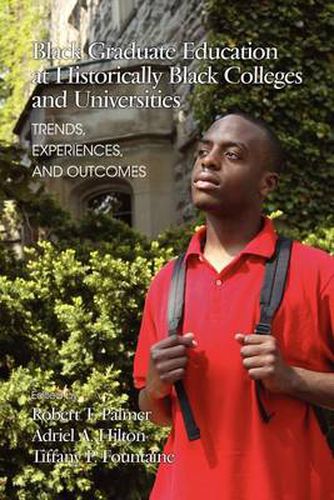Readings Newsletter
Become a Readings Member to make your shopping experience even easier.
Sign in or sign up for free!
You’re not far away from qualifying for FREE standard shipping within Australia
You’ve qualified for FREE standard shipping within Australia
The cart is loading…






This title is printed to order. This book may have been self-published. If so, we cannot guarantee the quality of the content. In the main most books will have gone through the editing process however some may not. We therefore suggest that you be aware of this before ordering this book. If in doubt check either the author or publisher’s details as we are unable to accept any returns unless they are faulty. Please contact us if you have any questions.
This book provides context about the experiences of Black graduate and professional students attending HBCUs. Indeed, such research is important, particularly since HBCUs play a significant role in the number of Blacks who receive doctorates and professional degrees (i.e. M.D., D.D.S., J.D. etc.), especially in science and engineering. In fact, according to Redd and Minor (2008), the role of HBCUs in graduate education will become even more significant as more seek to offer graduate and professional programs, particularly at the doctoral level. This book focuses on the historical nature of graduate and professional education at HBCUs and the programs’ contribution to society.
Further, it provides context about the experiences of students who have attended these institutions for their post-baccalaureate pursuits. Finally, the book addresses the future of graduate and professional education at HBCUs and what fundamental aspects are needed to ensure their survival, competitiveness, and growth.
This book appeals to faculty, departmental chairs, administrators, and students. Furthermore, higher education scholars, who conduct or have an interest in pursuing empirical research on Black graduate and professional education or the efficacy and relevance of HBCUs, will find this book useful given its unique and comprehensive approach focusing on supporting retaining, and graduating Black graduate students at HBCUs. In addition, this book is an invaluable teaching resource for faculty in Higher Education Administration, Student Affairs, or Sociology program.
$9.00 standard shipping within Australia
FREE standard shipping within Australia for orders over $100.00
Express & International shipping calculated at checkout
This title is printed to order. This book may have been self-published. If so, we cannot guarantee the quality of the content. In the main most books will have gone through the editing process however some may not. We therefore suggest that you be aware of this before ordering this book. If in doubt check either the author or publisher’s details as we are unable to accept any returns unless they are faulty. Please contact us if you have any questions.
This book provides context about the experiences of Black graduate and professional students attending HBCUs. Indeed, such research is important, particularly since HBCUs play a significant role in the number of Blacks who receive doctorates and professional degrees (i.e. M.D., D.D.S., J.D. etc.), especially in science and engineering. In fact, according to Redd and Minor (2008), the role of HBCUs in graduate education will become even more significant as more seek to offer graduate and professional programs, particularly at the doctoral level. This book focuses on the historical nature of graduate and professional education at HBCUs and the programs’ contribution to society.
Further, it provides context about the experiences of students who have attended these institutions for their post-baccalaureate pursuits. Finally, the book addresses the future of graduate and professional education at HBCUs and what fundamental aspects are needed to ensure their survival, competitiveness, and growth.
This book appeals to faculty, departmental chairs, administrators, and students. Furthermore, higher education scholars, who conduct or have an interest in pursuing empirical research on Black graduate and professional education or the efficacy and relevance of HBCUs, will find this book useful given its unique and comprehensive approach focusing on supporting retaining, and graduating Black graduate students at HBCUs. In addition, this book is an invaluable teaching resource for faculty in Higher Education Administration, Student Affairs, or Sociology program.